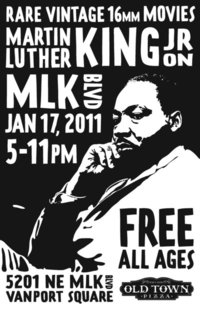Template:News
News
Saturday | January 22, 2011

Building Bike Lanes Creates Twice As Many Jobs Per Dollar Spent As Does Fixing Roads
<tab class=wikitable sep=tab head=top>
EMPLOYMENT PER
$1 MILLION EXPENDITURES Direct
jobs Indirect
jobs Induced
jobs Total
jobs Jobs
multiplier
Pedestrian projects 6.0 2.2 3.1 11.3 1.9
Bike lanes (on-street) 7.9 2.5 4.0 14.4 1.8
Bike boulevard (planned) 6.1 2.4 3.2 11.7 1.9
Road repairs and upgrades 3.8 1.5 2.0 7.4 1.9
Road resurfacing 3.4 1.5 1.9 6.8 2.0
</tab>
- Go to story: Building Bike Lanes Creates Twice As Many Jobs As Fixing Roads
- Go to report: Estimating The Employment Impacts Of Pedestrian, Bicycle, And Road Infrastructure
Friday | January 21, 2011

It's All Downhill From Here
A few decades ago, Portland was just a dingy Northwest backwater largely ignored by the rest of the country. Back then it seemed that most of the folks one met on the street were born and raised here. Many couldn't wait to get out: to San Francisco, or to Seattle, or to New York City, or to London, or to anywhere that looked, felt and sounded more exciting than Portland. Housing was dirt cheap. Everyday folks suffered low self-esteem and utterly lacked all pretense. To Portlandians, the Rose City wasn't merely white, it was white trash. City government was irredeemably corrupt[1] and P-Town's thuggish cops made even Bad Lieutenant[2] look good. Everything was perfect. Then the hipsters came. Everything changed. The newly minted, self-consciously "cool" Portlandians flooding into Stumptown took their "high-minded, laid-back, arts-focused, sustainability-oriented" vegan and passive-aggressive selves a bit too seriously. Fortunately, Dave Knows that "Portlandia may be the high water mark for the national media's obsession with Portland...an ongoing source of amusement to locals since the mid-oughts."[3] At last! Now we Portlandians can finally climb down from our self-absorbed pedestals and get back to the business of living life in an overlooked, thuggish, corrupt, passive-and-non-aggressive, white trash backwater.
- Go to story: TV Weekend: Portlandia
Thursday | January 20, 2011

Free electric car charging stations may soon make electric cars more practical
Already, nine public, free charging stations exist in the Portland Metro area. However, Federal stimulus money will soon be deploying over 1,200 stations in Oregon, concentrating on urban centers from Portland to Eugene. 45 of these will be "fast-charging" stations that can charge a Nissan Leaf (currently on backorder) to 80% in half an hour, while the driver grabs a coffee or meal. Even without charging at home, an electric vehicle driver in Portland wouldn't have to worry about range as they pay a couple bucks (for the parking space) to fully charge their battery for the next 100 miles.
- Go to story: Charging stations to reduce ‘range anxiety’
Wednesday | January 19, 2011

The Economics Of Misery vs. The Economics Of Happiness
Failing financial systems, imploding economic bubbles, massive corruption, widespread unemployment, radical wealth concentration, extreme poverty, resource wars. These social plagues and many more are all part of the economics of misery. Characterized by economic and financial "liberalization" (globalization), policies promoting the economics of misery are forcibly imposed on people everywhere by a tiny number of business and political elites. The motivations are as old as civilization: wealth extraction, resource expropriation, power, control, domination. The tactics for realizing these goals have also barely changed over the millennia: distract, suppress, divide and conquer. While this miserable science has certainly imposed untold misery and devastation on humanity from the dawn of civilization forward, it is only in the past three-quarters of a century (or so) that the economics of misery have threatened to snuff out all known life on our planet. Soon it will succeed. But there is another way: the economics of happiness. You have an opportunity to find out more about happier economics from Helena Norberg-Hodge, "an analyst of the impact of the global economy on cultures and agriculture worldwide and a pioneer of the localisation movement." Norberg-Hodge is the founder and director of the International Society for Ecology and Culture (ISEC).[4] She will screen her new film, The Economics of Happiness in Portland at the First Unitarian Church (Main Street Sanctuary: 1011 SW 12th Avenue, Portland, Oregon 97205) on Friday, January 21st, from 7:00 p.m. – 10:00 p.m.
- Go to web site: The Economics of Happiness
- More info: Find a Screening Near You
Tuesday | January 18, 2011

State bill would outlaw small children in bike trailers
Last week, State Rep. Mitch Greenlick introduced a bill to prohibit children under the age of 6 from riding in trailers behind bikes. Citing an OHSU study that found 5% of bike commuters in 2007 experienced an injury biking that required medical attention, Greenlick stated, "If I thought a law would save one child's life, I would step in and do it. Wouldn't you?" However, the biking community has resoundingly denounced the bill, countering that there was no evidence linking bike trailers to child deaths, and that discouraging family biking would reduce the "safety in numbers" principle, wherein the safety of biking is directly proportional to the number of bicyclists on the road.
- PortlandWiki page: HB 2228
- Go to story: Rep. Greenlick says safety concerns prompted child biking bill
- Go to story: Oregonian Wants To Ban Young Kids From Bikes
Monday | January 17, 2011

Night Of The Spiritually Dead
On Tuesday, April 4, 1967 Rev. Dr. Martin Luther King, Jr. stood before the congregation at Riverside Church in New York City and sealed his own fate, while prophesying the fate about to befall his country. On Thursday, April 4, 1968, exactly one year after delivering Beyond Vietnam--A Time to Break Silence,[5] a sniper's bullet ended King's life. An impassioned and unequivocal condemnation against the depravity of military violence, King's Beyond Vietnam speech stands out as the mightiest antiwar address ever delivered by human oratory. King reminded his audience that time stands still for no person, warning that "over the bleached bones and jumbled residues of numerous civilizations are written the pathetic words, 'Too late.'" Without a "true revolution of values," King warned, our sociopathically violent, hyper-militarized culture would continue "injecting poisonous drugs of hate into the veins of peoples normally humane." A "thing-oriented society" where "machines and computers, profit motives and property rights, are considered more important than people," is a society in which "the giant triplets of racism, extreme materialism, and militarism are incapable of being conquered," King intoned. Such a culture "cannot be reconciled with wisdom, justice, and love." Most ominously, King admonished Americans that a "nation that continues year after year to spend more money on military defense than on programs of social uplift is approaching spiritual death." But it was already "too late." King's mighty pleas and admonitions fell silently upon the "bleached bones and jumbled residues" of yet another civilization gone mad.
- Go to MLK Day on MLK Blvd.: MLK 16mm movie film screening. MLK Day on MLK Blvd.
- Go to MLK Day on MLK Blvd. Facebook fan page: MLK Day on MLK Blvd.
- Hear about the Revolutionary MLK: The Revolutionary MLK
Sunday | January 16, 2011

Portlandians As Easily Duped As Our "Illiberal" Counterparts
Social engineers and consent manufacturing practitioners wept with joy after studies revealed that "progressive" Portlandians are as dull and easily snookered as our nation's most fervent flagwavers. The findings shed light on how citizen "outrage" is manufactured over paltry spending for bike boulevards and bioswales while nary a peep is provoked by the trillions of dollars spent on armaments and defense contractors. The city's bike plan is projected to cost $613 million over the next twenty years. This works out to a twenty-year total of $1,075.44 per Portlandian, or $53.77 per Portlandian per year for the next 20 years.[6] By contrast, military-industrial-Congressional complex expenditures are estimated to cost $1,254,500,000,000 in the upcoming year. This chalks up to $4,086.32 per Portlandian in 2011 alone, an expense that's expected to continue each year until the Pentagon manages to extinguish all lifeforms that might one day present a terrorist "threat."[7]
- Go to story: Portland Mayor Sam Adams' bike plan, derailed by politics and bungled sales pitch, rides through controversy
- Go to bike plan: Portland Bicycle Plan for 2030
(Go to older news stories >>>)
References
- ↑ Portland's Tarnished Penny
- ↑ http://en.wikipedia.org/wiki/Bad_Lieutenant
- ↑ January 21, 2011: Portlandia Premieres
- ↑ Helena Norberg-Hodge
- ↑ Martin Luther King, Jr. Beyond Vietnam -- A Time to Break Silence
- ↑ Portland promotes urban cycling, but costs will be high
- ↑ Budget Military budget of the United States: Breakdown for 2011